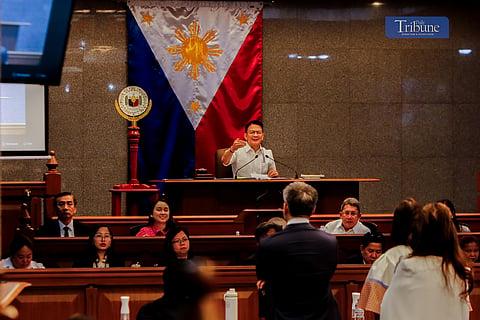
- NEWS
- the EDIT
- COMMENTARY
- BUSINESS
- LIFE
- SHOW
- ACTION
- GLOBAL GOALS
- SNAPS
- DYARYO TIRADA
- MORE

In what should have been a straightforward constitutional duty, the Senate on Monday offered a spectacle — a chamber entangled in its own cautious maneuvering as it prepared to try Vice President Sara Duterte for impeachment.
While Senate President Francis “Chiz” Escudero finally took his oath as presiding officer of the impeachment court — a move many expected to be the signal fire for trial proceedings — the chamber failed to offer clarity. Instead, it erupted into debates over whether Escudero’s oath meant anything at all.
The issue, it turns out, hinges on a single word: “forthwith.”
The Constitution mandates the Senate to act forthwith on Articles of Impeachment once transmitted by the House. And yet, the chamber appears paralyzed by its own interpretations. Legal minds — including retired Justice Adolfo Azcuna, constitutional scholars, and even framers of the Charter — have made clear that “forthwith” means immediate action, without unreasonable delay.
But that clarity is lost on senators who seem more concerned with optics than obligation.
Minority Leader Koko Pimentel pushed for swift action, supported by Senator Risa Hontiveros, who rightly pointed out that the only ones struggling to understand “forthwith” are those reluctant to follow it. But others in the chamber chose a different route: deflect, delay, and dissect.
Senator Joel Villanueva argued that Escudero’s oath was merely preparatory. He insisted the Articles must be formally read and summons issued before the court could be deemed convened. His points, while grounded in rules, leaned heavily on procedure as pretext — a pattern all too familiar in a political arena where hesitation is often more strategic than sincere.
Then there’s the curious silence of Duterte’s allies. Not one of them openly opposed the impeachment court’s formation. Instead, Senators like Ronald dela Rosa and Alan Peter Cayetano raised technical queries, stopping just short of resistance. Theirs is a subtler brand of dissent — opposition dressed in due diligence.
Even Senator Robin Padilla, ever loyal to Duterte, opted for a time-bound argument. His resolution sought the case’s dismissal on the premise that it could not be concluded before the 19th Congress adjourns. It’s a legal sleight of hand, not an argument on merit.
And then there is Escudero himself — ever careful, ever calibrated. His choice to take the oath without declaring the court officially in session speaks volumes. In tone and posture, he projected someone trying hard to appear neutral, maybe even frustrated by the weight of political expectations. Whether he leans toward the opposition or the administration remains unclear. What is clear is this: he’s leaving his options open.
In contrast, Senator Miguel Zubiri took a firmer stance — echoing the need for speed but warning the trial must end with the current Congress. In other words: begin now, or let the clock kill it.
That clock is ticking fast. The Senate will officially reconvene as an impeachment court on Wednesday, just two days before the 19th Congress ends. With only three session days left, it’s hard to shake off the suspicion that some senators are banking on the trial’s expiration by delay.
But the public is watching. Legal luminaries, civil society, and academic institutions have lent their support to the trial — not as a political maneuver, but as a matter of accountability. They know, as the Constitution intended, that impeachment is not a legislative favor. It’s a duty.
Every time a senator questions the obvious, or hides behind rules already clarified, they reveal where they truly stand. Not necessarily for or against Duterte — but for or against the rule of law.
